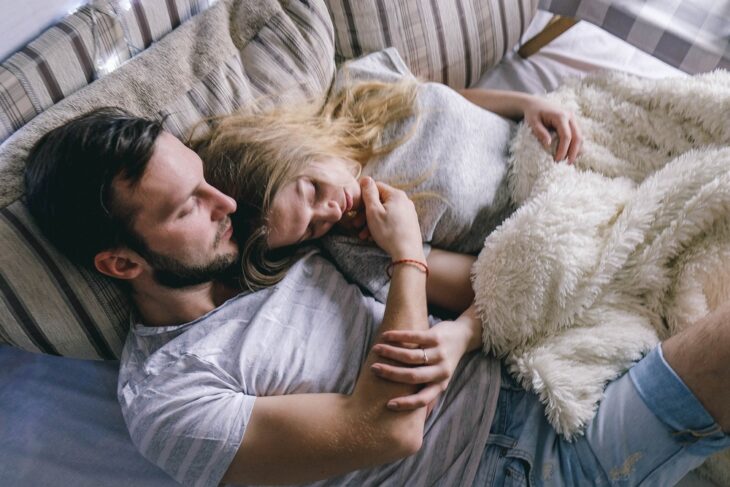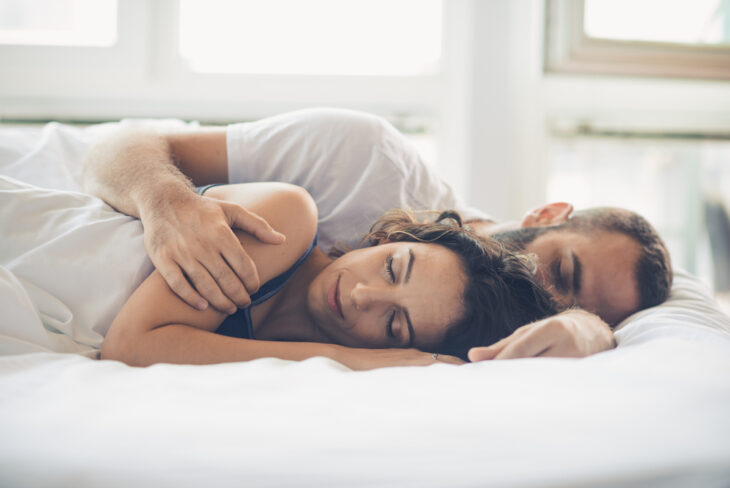Despite partners often complaining about their partner’s snoring, a new survey has revealed that those laying next to someone they love, actually fall asleep a lot quicker, and also sleep for a lot longer throughout the night.
Just under three quarters of adults in a relationship said they take less than an hour to fall asleep while only a quarter of singletons said the same, according to research available here.
Albeit not a huge difference, half of adults with a loving partner admit to get over seven night’s sleep each night, while just 42% of adults get seven hours plus of snoozing per night.
So, why exactly do we sleep better next to someone that we’re in love with? Get Laid Beds spoke to Charisse Cooke, a relationship psychotherapist at Charisse Cooke Therapy, who has said the following:

Source: medium.com
“Psychologically, the presence of a partner represents security and reduces feelings of danger, loneliness and isolation. Even though sleeping with a partner can sometimes cause disruption to our sleeping patterns, due to snoring, restlessness or medical health issues, the vast majority of people prefer that to sleeping alone. This speaks of our interdependence with other people and the importance of social relationships and sense of community, even in our modern, individualistic lives.”
The same study also looked into what people do before bed that contributes to a good night’s sleep. Turns out, the best thing we can do before bed is read a book – with over half of the people who admit reading to be the last thing they do before bed, to have seven hours plus of sleep per night.
For those that struggle to concentrate on reading a book before bed, some advice received from Katherine Hall, Sleep Expert at Somnus Sleep Therapy, suggests:
“If the temptation to watch television immediately before closing your eyes is strong, it’s important to start realistically. It’s all about getting into a manageable routine, rather than doing it for a couple of nights and giving up because it’s not sustainable.
Find a genre that interests you, but isn’t too difficult to process or follow. The last thing you want is to dive into an academic journal of some sort only to be laying there afterwards trying to understand it all.
Self-help is a great genre as not only are they designed to be read by everyone, the subject matter can also have a positive impact on the following day, thus reinforcing a more concrete routine in general.”

Source: lifehack.org
However, for those that take a long walk to ‘tire themselves out’ before hitting the bed, you’re doing it wrong. Turns out, that this is the least effective thing that someone can do, with it being more than seven times less effective than reading, the number one spot. Only a third of late-night walkers actually get seven hours of sleep, or more, and another third get under four hours of sleep per night.
We all know that social media and blue light is bad for us before we hit the pillow, but this survey reassured us that going on our phone really isn’t good for a quick fall-asleep. Half of respondents said that it takes them two hours to fall asleep once turning their phone off to actually be in a full snooze.
So, why is it that some routines are better than others? According to WebMD, working out late at night can raise your core body temperature, speed your heart rate up and tells your body to keep producing adrenaline. This is why the likes of a late walk can do more harm than good.
Meanwhile, reading helps us reduce stress levels, so those that are late night over thinkers will really benefit from some late-night books. According to Healthline, reading for half an hour can reduce as much stress as yoga can for the same amount of time.

Source: johnryanbydesign.co.uk
A 2024 study, mentioned in the same Healthline article, conducted an experiment that focussed on whether people that read before bed had a better sleep quality than those that don’t. 496 participants were asked to read before bed, and another 496 participants were told to not read before bed. After the first week went by, 42% of the readers felt that their sleep improved, while only 28% of those that didn’t read reported that their sleep improved.
There were other rituals that were looked at in the study. These included setting out clothes in the morning, meditation, writing in a journal, making a cup of tea and making a to-do list for tomorrow.
However, it’s millennials that’re most likely to stick to a bedtime ritual, as opposed to any other generation. In fact, 16-24 year olds are twice as likely to stick to their bedtime ritual than those that are over the age of 55.
If you’re someone that struggles getting to sleep at night, or someone that can’t remain asleep at night, incorporating a night-time routine might be the next step. If you’re unsure on what routine to start with, start with reading, as that’s been proven in this study as the most successful ritual to help individuals to fall asleep.
However, if you’re in a relationship and sleeps in a separate bed as their partner, due to loud snoring or other bad traits that they might have, then perhaps try and spend the night next to them for a night to see if you actually do manage to fall asleep quicker or have a better-quality sleep.

Source: plushbeds.com
There are plenty of products that you can try and incorporate into your relationship to help aid a better night’s sleep together, for example, some ear-plugs that block out the snoring of the person next to you, a mattress that adjusts to your body temperature for those that have to sleep with someone too hot or too cold and therefore need more/less layers, and even just improving simple interiors, such as using neutral colours, or using more houseplants.
If you’re still struggling on getting to sleep or staying asleep after trying both the above, then other options of things to do before bed that have been proven to be successful in the study include turning off all technology around you, setting out your clothes for the next day and taking a hot bath or shower.
If you’re after some more sleep tips, then check out our sleep tips for woman blog here or our blog on healthy sleep habits here.
